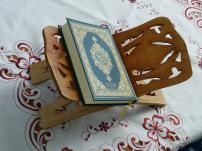Muslims consider Ramadan to be the holiest month of the Islamic lunar calendar. Each month starts with the sighting of the new crescent moon. Ramadan is the ninth month of the Islamic year and as lunar calendar months are shorter than solar months the first day of Ramadan is 11 days earlier each year. This year Ramadan starts on 6 June and runs until 5 July.
Ramadan is a holy month for Muslims as they believe that Allah first revealed the Qur’an, the sacred book of Islam, to the Prophet Muhammed during this month.
Fasting
Ramadan is a period of spiritual cleansing, self-control, discipline and reflection. Muslims fast or abstain from food and drink between dawn and dusk. They do this to cleanse the body and mind and to think of the suffering of the poor.
Muslims eat two meals a day during the fasting month. The pre-dawn meal, suhoor, is eaten before sunrise. After sunset, iftar is taken. Traditionally people will break the fast by eating dates and drinking water. After this is the main meal but there is no typical Ramadan food – it varies from country to country and family traditions. Often family and friends will sit down together to share a meal bringing a real sense of community and belonging.

Some people are exempt from fasting including the elderly, pregnant women, children and the physically or mentally ill. Children usually join in the fast from the age of 12 but some younger children might fast for a few hours or half a day.

Prayers
During Ramadan, Muslims continue their usual ritual of five daily prayers. Plus there is the reading of the tarawih or night prayer. At mosques the Qur’an is recited every night so that by the end of Ramadan the whole of the scared book has been read.
Ramadan Around the World
Ramadan is observed by Muslims across the world. However, depending on where they live this can be challenging. As the date of Ramadan changes each year, sometimes it is during the winter, when days are short. Sometimes, like this year, it is during summer when the days are longest. In 2016 Ramadan includes the longest day (20 June) in the Northern hemisphere. On this day in the UK there will be nearly 17 hours between sunrise and sunset – a very long time to fast. In some parts of the world, such as northern Scandinavia and northern Canada, at this time of year the sun never sets so what do Muslims who live in these areas do? Many believe that if the daylight is longer than 18 hours you can follow the sunrise/sunset times of Mecca or the nearest Muslim country.
Eid-al-Fitr
Eid-al-Fitr is a Muslim holiday and marks the end of Ramadan. It is the Festival of the Breaking of the Fast. At Eid everyone celebrates the end of Ramadan and fasting with celebratory meals. They wear new clothes and decorate and light up homes. Special services are held in mosques and Allah is praised for helping everyone get through the fast. People also give gifts and give to charity to help the poor. It is a very special celebration and a time to spend with family and friends.
At Early Learning Furniture we provide early years’ education resources and supply classroom furniture, school library furniture and school dining furniture. For more information on our products please contact us or call on 01733 511121.
Permalink:
https://www.earlylearningfurniture.co.uk/blog/ramadan.aspx